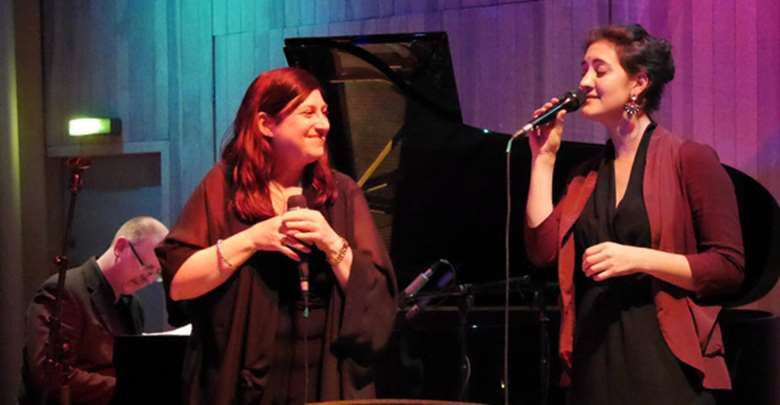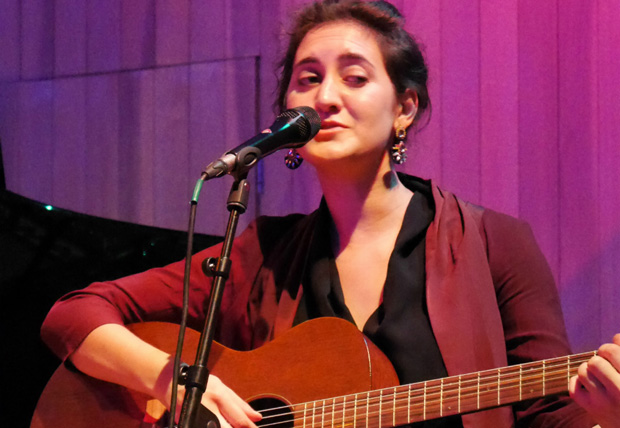Anita Wardell and Nicky Schrire mix jazz and folk at The Forge
Thursday, February 19, 2015
We might have been in Camden, but in a concert of rare intimacy and tenderness, singers Anita Wardell (above left) and Nicky Schrire (above right), and pianist Robin Aspland conjured the clear, bright air of their Southern Hemisphere roots.

Wardell, who grew up in Australia, and Schrire, originally South African (Robin Aspland is an honorary Antipodean), have created an ensemble – informally titled the Southern Hemisphere Trio – whose ambitious and inspiring range belies its modest size and simple format.
The format is in fact part duo, part trio, with the two singers performing together at the beginning and end of each set, and having Aspland’s subtly responsive accompaniment (with bursts of his own improvisations) to themselves the rest of the time. They’re different, though complementary voices: Wardell is well known for her mellow tone, acrobatic vocalising, and quicksilver jazz technique; Schrire’s voice is a great vehicle for lyrics, with a pure, translucent tone that soars endlessly into the upper register, and a richer, darker bottom end that works beautifully for her melancholy, alt-folk material. The rapport between the two singers is obvious from the first song, and the intricacy with which they succeed in blending Wardell’s lithe vocalisations and Schrire’s richness of sound makes for a deeply emotional experience.

Schrire is also a considerable songwriter, whose songs convey a deep, often melancholic yearning for togetherness. The first song, ‘Together’, describes a kind of spiritual journey across an undefined open space that allows Schrire’s voice full scope for expansiveness. The rest of the first set was her own, and took in Ellington’s ‘In Mellow Tone’, the South African ‘Father of My Children’, Fud Livingston’s ‘I’m Thru With Love’, several of her own songs including the delicately reflective ‘Space and Time’, another showcase for her gossamer upper register, and, with Wardell, June Tabor’s ‘Send Us A Quiet Night’. Schrire isn’t the most instinctive swinger on the scene, but in stripping the more traditional repertoire of its cloying stylistic accretions, she often manages to showcase the lyrics more effectively. This was certainly the case with the Livingston – a song certainly in need of refreshing – where Schrire also demonstrated her skills as a vocal actor, owning the words as few singers can.
The second set began with another of Schrire’s originals, ‘Doesn’t Everybody’, an especially poignant vision of loss and heartbreak. As a soloist, Wardell chose a more traditional jazz repertoire, and came into her own with her adaptation of Parker’s ‘Body and Soul’, in which she vocalised much of the original sax line, Billie Holiday’s ‘You Turn the Tables on Me’, performed with a delicious lightness of touch, and Oscar Pettiford’s ‘Trichotism’, slick and witty. For nimbleness of vocal delivery, Wardell is in a class of her own.
They ended, together, with Wardell’s arrangement of Pat Metheny’s ‘The Road’, perhaps their most full-blooded song of a gig in which they traversed the heart of the jazz tradition, as well as world, folk, and pop, with ease, and an undemonstrative but thoroughly convincing versatility. The subject matter, focusing on travel, homecoming, and heartbreak, gave some sense of a musical heart (in Schrire’s case, certainly) somewhere between jazz and a kind of contemporary alt-folk, but the changes of musical direction felt unforced and spontaneous. Though fairly small in floor area, enabling the audience to enjoy the intimacy of the atmosphere, the Forge has high ceilings, all glass, steel, or polished wood. This makes the acoustic of the quiet passages sometimes unpredictable, and a raw edge occasionally crept into what was otherwise a musical embrace of the most delicate loveliness.
– Matthew Wright